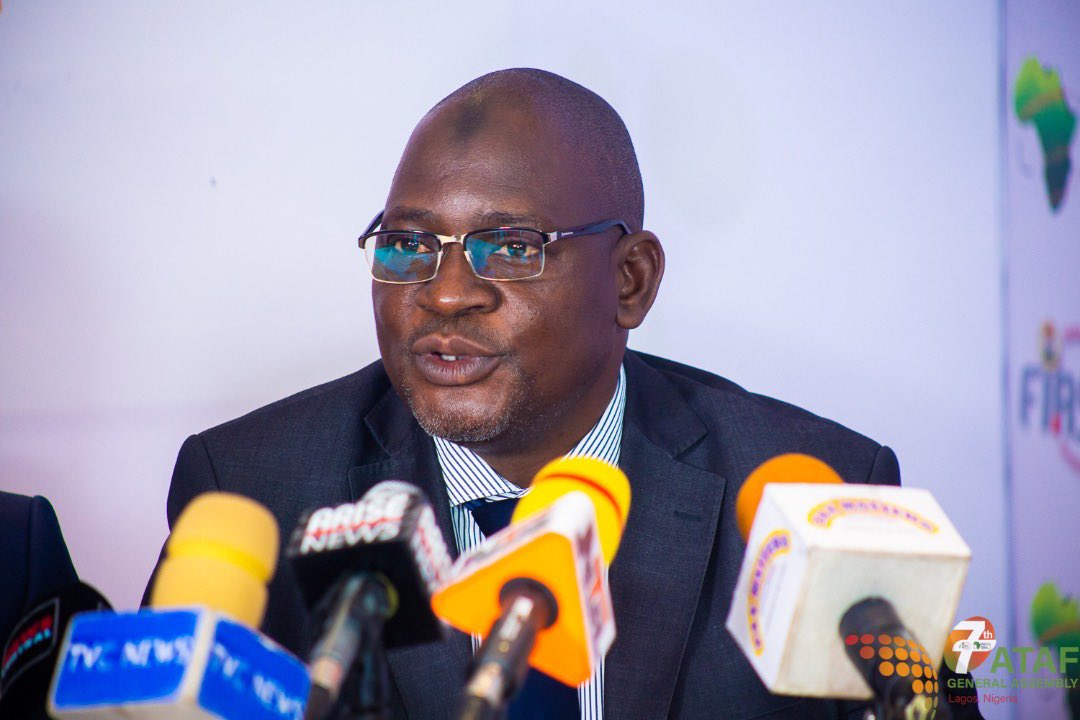

Feature
Nami’s Magic Wand: Restructuring Revenue Collection in Nigeria
Revenue generation is very critical to the survival of a country or otherwise all over the world. It is non-debatable that most poor countries of the world are poor because they have a problem of revenue.
To fix the problem of revenue generation in most developing and emerging markets, the national and sub-national governments of such countries pay more than a passing interest in the operations and management of the countries’ internal or inland revenue bureaus/services/boards which supervise revenue collection, aside from placing other programmes and policies to shore up their revenue base.
In Nigeria, the Federal Inland Revenue Service(FIRS) is the body statutorily saddled with the responsibility of managing the nation’s revenue collection. Established in 1943, the service became autonomous via the passing of the FIRS (Establishment) Act 13 of 2007. The core functions of the service are to assess, collect, remit, and account for the federation’s taxes and revenues.
Over the years, the FIRS has undergone several transformations under various leadership and management. However, its phase between 2020 and 2022 has been of striking relevance and importance given the declarations of unprecedented revenue collected on behalf of the federal government by the service.
According to multiple industry experts familiar with the issues, the turnaround in the revenue collection credential of the service is substantially due to the efforts of the leadership headed by Muhammad Nami, its Executive Chairman.
It did not, therefore, come as a surprise to a lot of people when the Federal Inland Revenue Service (FIRS) announced on Monday that it collected over N10 trillion in tax revenue in the year 2022, the highest tax collection ever recorded in its history. The Service declared this in its “FIRS 2022 Performance Update,” report signed by its Executive Chairman, Mr Nami, after his briefing with President Muhammadu Buhari.
It is the first time the FIRS would cross the 10-trillion Naira mark in tax revenue collection after several decades of existence. And that’s a milestone in a struggling economy like Nigeria’s. In the Performance Update made known to the public, the service said it collected a total of N10.1 trillion in both oil (N4.09 trillion) and non-oil (N5.96 trillion) revenues as against a target of N10.44 trillion in 2022.
The report further noted that Companies’ Income Tax contributed N2.83 trillion; Value Added Tax N2.51 trillion; Electronic Money Transfer Levy N125.67 billion and Earmarked Taxes N353.69 billion while non-oil taxes contributed 59% of the total collection in the year, oil tax collection stood at 41% of the total collection. One interesting takeaway from this is that the non-oil sector is beginning to live up to expectations especially now that there are so many uncertainties in the global oil market.
The Performance Update Report further clarified that included in the total revenue sum is the sum of N146.27 billion which is the total value of certificates issued by the Service to private investors and NNPC for road infrastructure under the Road Infrastructure Development Refurbishment Investment Tax Credit Scheme created by Executive Order No. 007 of 2019.
The report also stated that the N10.1 trillion is exclusive of tax waived on account of various tax incentives granted under the respective laws, which amounted to N1,805,040,163,008.
HOW THE FEAT WAS ACHIEVED
Like the saying that nothing good comes easy, finance specialists, especially in the public sector, say the FIRS could not have achieved the feat without putting in place some reforms and mechanisms to actualise the feat. Essentially, the deployment of technology through the instrumentality of the automation of the service’s administrative and operational processes in tax collection played a crucial role in the massive turnover.
True to the experts’ assertion, while providing perspective to the unprecedented tax collection, the service noted in the performance report that the Muhammad Nami-led management upon assumption of office came up with a four-point focus, namely: administrative and operational restructuring; making the service customer-focused; creating a data-centric institution; and improving its stakeholder relations. It further noted that throughout 2020 to 2022, the management had introduced reforms bordering around these four-point focuses which were producing results.
“The reforms introduced at different times from 2020 are gradually yielding fruits. By the close of 2022, the Service had fully restructured the administration of the Service for maximum efficiency and achieved internal cohesion such that all functional units are working in unison towards the achievement of set goals.
“As a result of a conducive environment created for staff, officers of the Service are pulling their weight on the global stage with international recognitions and awards;
“The Service had also automated most of the administrative and operational processes. A major leap was the full deployment of the TaxPro Max for end-to-end administration of taxes in June 2021. The module for the automated TCC went live 1st January 2023 while taxpayers had already downloaded over 1,000 TCCs this year without having to visit FIRS office,” the report read.
The report also noted that the Service had operationalised its data mining and analysis system thereby allowing for data-backed taxpayer profiling. This is particularly good as taxpayers’ metrics and analytics will always assist the Service to know what it’s getting from each and every tax-paying entity based on credible data gathering and assessment.
Other reforms the Service introduced in the period under review focused on the detoxification of the tax environment by ridding it of mutual mistrust, negative tax morale, and tax evasion, through effective taxpayer education, open engagement with stakeholders, and improved services. It noted that it is courtesy of these reforms, framed around the four-focal points that the Service was able to achieve the collection.
The man of the moment, Mr Nami, while commenting on the N10.1 trillion record tax collection achieved under his leadership, stated that it was made possible through “dogged implementation of strategic reforms over the past two years; a renewed commitment by officers of the Service, accompanied with a boosted morale; as well as the innovative deployment of technology for automation of both tax administration and operational processes.
“This collection was possible through collaboration with our stakeholders, from our colleagues at the Executive branch of government to the members of the judiciary, to our brothers and sisters at the National Assembly, as well as the tax advisory committee, professional bodies, unions, and most crucially our taxpayers.”
AND THIS IS NOT THE FIRST TIME
2022 is not the first year the FIRS made a giant leap in revenue collection. In fact, 2022 is the second consecutive year that the Service will be recording unprecedented tax collection. In 2021, the Service achieved a record tax collection of N6.405 trillion, over a hundred percent of its collection target for the year, as well as the first time that the Service will cross the 6–trillion mark.
In 2022, building on the success of the preceding year, the Service achieved a record collection of N10.1 trillion, being over 96% of its collection target for the year, and the first time the Service will cross the 10–trillion mark. This collection represents an over one hundred percent leap from the tax collected by the Service in 2020—the first year of the current management of the Service.
PROJECTIONS FOR 2023
As for 2023, Mr Nami stated that the Service would build on the current reforms, achieve full automation and continue to establish a resilient Service that would continue to provide sustainable tax revenue to fund the government.
The government truly needs all it can to generate revenue this year and borrow less because of the burgeoning debt profile of the country, which has become a source of worrying concern to Nigerians. There’s no whiff of doubt that the FIRS will double down on revenue collection to help the government meet its revenue target. “We intend to maintain, and even improve on the momentum in 2023,” Mr Nami stated.
“We have peaked, but this is not certainly our peak. In fact, my hope is that this would be the least sum the Service would ever collect going forward. Our goal is to identify more areas where we can improve on, in the delivery and efficiency of our collection; and plug loopholes, while deploying innovative reforms in data and artificial intelligence.
“Ultimately, we believe that the FIRS can shoulder the responsibility of providing revenue needed for the governments across the Federation to cater for the needs of the Nigerian people through taxes.
“This is feasible once we get the much-desired support from the three tiers and arms of government, as well as all stakeholders.”
CHALLENGES
Perhaps the greatest challenge the FIRS may face in its quest to rake in more revenue for the government in 2023 will be a seeming lack of cooperation from taxpayers who are facing existential threats from galloping inflation, insecurity, increasing lending rates and the rising cost of power, among others.
The perceived absence of transparency and lack of accountability in the management of the country’s revenue is also a snag. Although FIRS is not to blame for this, the taxpayers’ understanding is that it is the body that collects the taxes for the country. Going forward, the government has to be more accountable to the people and deploy the revenue judiciously to fund critical infrastructures, improve the standard of living of Nigerians, provide jobs, create access to quality healthcare, e.t.c.
Of course, FIRS also needs to block more leakages in its operations and loopholes which could be leveraged by unscrupulous staff and taxpayers to game the system and thus criminally divert what should accrue into the Service’s purse into their personal accounts or that of their allies. This is where technology, as hinted by the Executive Chairman, will help minimise waste and potential for fraud to the bare minimum.
APPRECIATION
The FIRS’s feat in the 10.1 trillion Naira tax collection did not come alone via the Service’s solo efforts. It received multispectral collaboration and support from the political leadership of the country.
In the performance update report, FIRS appreciated President Muhammadu Buhari for his support, as well as the Minister of Finance, Budget and National Planning, Mrs Zainab Ahmed, the Minister of State, Mr Clem Agba, and the National Assembly.
Importantly, the service commended all patriotic taxpayers who paid their taxes correctly, stakeholders for their support, and officers of the Service for their dedication to duty.Nami’s Magic Wand: Restructuring Revenue Collection in Nigeria
Revenue generation is very critical to the survival of a country or otherwise all over the world. It is non-debatable that most poor countries of the world are poor because they have a problem of revenue.
To fix the problem of revenue generation in most developing and emerging markets, the national and sub-national governments of such countries pay more than a passing interest in the operations and management of the countries’ internal or inland revenue bureaus/services/boards which supervise revenue collection, aside from placing other programmes and policies to shore up their revenue base.
In Nigeria, the Federal Inland Revenue Service(FIRS) is the body statutorily saddled with the responsibility of managing the nation’s revenue collection. Established in 1943, the service became autonomous via the passing of the FIRS (Establishment) Act 13 of 2007. The core functions of the service are to assess, collect, remit, and account for the federation’s taxes and revenues.
Over the years, the FIRS has undergone several transformations under various leadership and management. However, its phase between 2020 and 2022 has been of striking relevance and importance given the declarations of unprecedented revenue collected on behalf of the federal government by the service.
According to multiple industry experts familiar with the issues, the turnaround in the revenue collection credential of the service is substantially due to the efforts of the leadership headed by Muhammad Nami, its Executive Chairman.
It did not, therefore, come as a surprise to a lot of people when the Federal Inland Revenue Service (FIRS) announced on Monday that it collected over N10 trillion in tax revenue in the year 2022, the highest tax collection ever recorded in its history. The Service declared this in its “FIRS 2022 Performance Update,” report signed by its Executive Chairman, Mr Nami, after his briefing with President Muhammadu Buhari.
It is the first time the FIRS would cross the 10-trillion Naira mark in tax revenue collection after several decades of existence. And that’s a milestone in a struggling economy like Nigeria’s. In the Performance Update made known to the public, the service said it collected a total of N10.1 trillion in both oil (N4.09 trillion) and non-oil (N5.96 trillion) revenues as against a target of N10.44 trillion in 2022.
The report further noted that Companies’ Income Tax contributed N2.83 trillion; Value Added Tax N2.51 trillion; Electronic Money Transfer Levy N125.67 billion and Earmarked Taxes N353.69 billion while non-oil taxes contributed 59% of the total collection in the year, oil tax collection stood at 41% of the total collection. One interesting takeaway from this is that the non-oil sector is beginning to live up to expectations especially now that there are so many uncertainties in the global oil market.
The Performance Update Report further clarified that included in the total revenue sum is the sum of N146.27 billion which is the total value of certificates issued by the Service to private investors and NNPC for road infrastructure under the Road Infrastructure Development Refurbishment Investment Tax Credit Scheme created by Executive Order No. 007 of 2019.
The report also stated that the N10.1 trillion is exclusive of tax waived on account of various tax incentives granted under the respective laws, which amounted to N1,805,040,163,008.
HOW THE FEAT WAS ACHIEVED
Like the saying that nothing good comes easy, finance specialists, especially in the public sector, say the FIRS could not have achieved the feat without putting in place some reforms and mechanisms to actualise the feat. Essentially, the deployment of technology through the instrumentality of the automation of the service’s administrative and operational processes in tax collection played a crucial role in the massive turnover.
True to the experts’ assertion, while providing perspective to the unprecedented tax collection, the service noted in the performance report that the Muhammad Nami-led management upon assumption of office came up with a four-point focus, namely: administrative and operational restructuring; making the service customer-focused; creating a data-centric institution; and improving its stakeholder relations. It further noted that throughout 2020 to 2022, the management had introduced reforms bordering around these four-point focuses which were producing results.
“The reforms introduced at different times from 2020 are gradually yielding fruits. By the close of 2022, the Service had fully restructured the administration of the Service for maximum efficiency and achieved internal cohesion such that all functional units are working in unison towards the achievement of set goals.
“As a result of a conducive environment created for staff, officers of the Service are pulling their weight on the global stage with international recognitions and awards;
“The Service had also automated most of the administrative and operational processes. A major leap was the full deployment of the TaxPro Max for end-to-end administration of taxes in June 2021. The module for the automated TCC went live 1st January 2023 while taxpayers had already downloaded over 1,000 TCCs this year without having to visit FIRS office,” the report read.
The report also noted that the Service had operationalised its data mining and analysis system thereby allowing for data-backed taxpayer profiling. This is particularly good as taxpayers’ metrics and analytics will always assist the Service to know what it’s getting from each and every tax-paying entity based on credible data gathering and assessment.
Other reforms the Service introduced in the period under review focused on the detoxification of the tax environment by ridding it of mutual mistrust, negative tax morale, and tax evasion, through effective taxpayer education, open engagement with stakeholders, and improved services. It noted that it is courtesy of these reforms, framed around the four-focal points that the Service was able to achieve the collection.
The man of the moment, Mr Nami, while commenting on the N10.1 trillion record tax collection achieved under his leadership, stated that it was made possible through “dogged implementation of strategic reforms over the past two years; a renewed commitment by officers of the Service, accompanied with a boosted morale; as well as the innovative deployment of technology for automation of both tax administration and operational processes.
“This collection was possible through collaboration with our stakeholders, from our colleagues at the Executive branch of government to the members of the judiciary, to our brothers and sisters at the National Assembly, as well as the tax advisory committee, professional bodies, unions, and most crucially our taxpayers.”
AND THIS IS NOT THE FIRST TIME
2022 is not the first year the FIRS made a giant leap in revenue collection. In fact, 2022 is the second consecutive year that the Service will be recording unprecedented tax collection. In 2021, the Service achieved a record tax collection of N6.405 trillion, over a hundred percent of its collection target for the year, as well as the first time that the Service will cross the 6–trillion mark.
In 2022, building on the success of the preceding year, the Service achieved a record collection of N10.1 trillion, being over 96% of its collection target for the year, and the first time the Service will cross the 10–trillion mark. This collection represents an over one hundred percent leap from the tax collected by the Service in 2020—the first year of the current management of the Service.
PROJECTIONS FOR 2023
As for 2023, Mr Nami stated that the Service would build on the current reforms, achieve full automation and continue to establish a resilient Service that would continue to provide sustainable tax revenue to fund the government.
The government truly needs all it can to generate revenue this year and borrow less because of the burgeoning debt profile of the country, which has become a source of worrying concern to Nigerians. There’s no whiff of doubt that the FIRS will double down on revenue collection to help the government meet its revenue target. “We intend to maintain, and even improve on the momentum in 2023,” Mr Nami stated.
“We have peaked, but this is not certainly our peak. In fact, my hope is that this would be the least sum the Service would ever collect going forward. Our goal is to identify more areas where we can improve on, in the delivery and efficiency of our collection; and plug loopholes, while deploying innovative reforms in data and artificial intelligence.
“Ultimately, we believe that the FIRS can shoulder the responsibility of providing revenue needed for the governments across the Federation to cater for the needs of the Nigerian people through taxes.
“This is feasible once we get the much-desired support from the three tiers and arms of government, as well as all stakeholders.”
CHALLENGES
Perhaps the greatest challenge the FIRS may face in its quest to rake in more revenue for the government in 2023 will be a seeming lack of cooperation from taxpayers who are facing existential threats from galloping inflation, insecurity, increasing lending rates and the rising cost of power, among others.
The perceived absence of transparency and lack of accountability in the management of the country’s revenue is also a snag. Although FIRS is not to blame for this, the taxpayers’ understanding is that it is the body that collects the taxes for the country. Going forward, the government has to be more accountable to the people and deploy the revenue judiciously to fund critical infrastructures, improve the standard of living of Nigerians, provide jobs, create access to quality healthcare, e.t.c.
Of course, FIRS also needs to block more leakages in its operations and loopholes which could be leveraged by unscrupulous staff and taxpayers to game the system and thus criminally divert what should accrue into the Service’s purse into their personal accounts or that of their allies. This is where technology, as hinted by the Executive Chairman, will help minimise waste and potential for fraud to the bare minimum.
APPRECIATION
The FIRS’s feat in the 10.1 trillion Naira tax collection did not come alone via the Service’s solo efforts. It received multispectral collaboration and support from the political leadership of the country.
In the performance update report, FIRS appreciated President Muhammadu Buhari for his support, as well as the Minister of Finance, Budget and National Planning, Mrs Zainab Ahmed, the Minister of State, Mr Clem Agba, and the National Assembly.
Importantly, the service commended all patriotic taxpayers who paid their taxes correctly, stakeholders for their support, and officers of the Service for their dedication to duty.Nami’s Magic Wand: Restructuring Revenue Collection in Nigeria
Revenue generation is very critical to the survival of a country or otherwise all over the world. It is non-debatable that most poor countries of the world are poor because they have a problem of revenue.
To fix the problem of revenue generation in most developing and emerging markets, the national and sub-national governments of such countries pay more than a passing interest in the operations and management of the countries’ internal or inland revenue bureaus/services/boards which supervise revenue collection, aside from placing other programmes and policies to shore up their revenue base.
In Nigeria, the Federal Inland Revenue Service(FIRS) is the body statutorily saddled with the responsibility of managing the nation’s revenue collection. Established in 1943, the service became autonomous via the passing of the FIRS (Establishment) Act 13 of 2007. The core functions of the service are to assess, collect, remit, and account for the federation’s taxes and revenues.
Over the years, the FIRS has undergone several transformations under various leadership and management. However, its phase between 2020 and 2022 has been of striking relevance and importance given the declarations of unprecedented revenue collected on behalf of the federal government by the service.
According to multiple industry experts familiar with the issues, the turnaround in the revenue collection credential of the service is substantially due to the efforts of the leadership headed by Muhammad Nami, its Executive Chairman.
It did not, therefore, come as a surprise to a lot of people when the Federal Inland Revenue Service (FIRS) announced on Monday that it collected over N10 trillion in tax revenue in the year 2022, the highest tax collection ever recorded in its history. The Service declared this in its “FIRS 2022 Performance Update,” report signed by its Executive Chairman, Mr Nami, after his briefing with President Muhammadu Buhari.
It is the first time the FIRS would cross the 10-trillion Naira mark in tax revenue collection after several decades of existence. And that’s a milestone in a struggling economy like Nigeria’s. In the Performance Update made known to the public, the service said it collected a total of N10.1 trillion in both oil (N4.09 trillion) and non-oil (N5.96 trillion) revenues as against a target of N10.44 trillion in 2022.
The report further noted that Companies’ Income Tax contributed N2.83 trillion; Value Added Tax N2.51 trillion; Electronic Money Transfer Levy N125.67 billion and Earmarked Taxes N353.69 billion while non-oil taxes contributed 59% of the total collection in the year, oil tax collection stood at 41% of the total collection. One interesting takeaway from this is that the non-oil sector is beginning to live up to expectations especially now that there are so many uncertainties in the global oil market.
The Performance Update Report further clarified that included in the total revenue sum is the sum of N146.27 billion which is the total value of certificates issued by the Service to private investors and NNPC for road infrastructure under the Road Infrastructure Development Refurbishment Investment Tax Credit Scheme created by Executive Order No. 007 of 2019.
The report also stated that the N10.1 trillion is exclusive of tax waived on account of various tax incentives granted under the respective laws, which amounted to N1,805,040,163,008.
HOW THE FEAT WAS ACHIEVED
Like the saying that nothing good comes easy, finance specialists, especially in the public sector, say the FIRS could not have achieved the feat without putting in place some reforms and mechanisms to actualise the feat. Essentially, the deployment of technology through the instrumentality of the automation of the service’s administrative and operational processes in tax collection played a crucial role in the massive turnover.
True to the experts’ assertion, while providing perspective to the unprecedented tax collection, the service noted in the performance report that the Muhammad Nami-led management upon assumption of office came up with a four-point focus, namely: administrative and operational restructuring; making the service customer-focused; creating a data-centric institution; and improving its stakeholder relations. It further noted that throughout 2020 to 2022, the management had introduced reforms bordering around these four-point focuses which were producing results.
“The reforms introduced at different times from 2020 are gradually yielding fruits. By the close of 2022, the Service had fully restructured the administration of the Service for maximum efficiency and achieved internal cohesion such that all functional units are working in unison towards the achievement of set goals.
“As a result of a conducive environment created for staff, officers of the Service are pulling their weight on the global stage with international recognitions and awards;
“The Service had also automated most of the administrative and operational processes. A major leap was the full deployment of the TaxPro Max for end-to-end administration of taxes in June 2021. The module for the automated TCC went live 1st January 2023 while taxpayers had already downloaded over 1,000 TCCs this year without having to visit FIRS office,” the report read.
The report also noted that the Service had operationalised its data mining and analysis system thereby allowing for data-backed taxpayer profiling. This is particularly good as taxpayers’ metrics and analytics will always assist the Service to know what it’s getting from each and every tax-paying entity based on credible data gathering and assessment.
Other reforms the Service introduced in the period under review focused on the detoxification of the tax environment by ridding it of mutual mistrust, negative tax morale, and tax evasion, through effective taxpayer education, open engagement with stakeholders, and improved services. It noted that it is courtesy of these reforms, framed around the four-focal points that the Service was able to achieve the collection.
The man of the moment, Mr Nami, while commenting on the N10.1 trillion record tax collection achieved under his leadership, stated that it was made possible through “dogged implementation of strategic reforms over the past two years; a renewed commitment by officers of the Service, accompanied with a boosted morale; as well as the innovative deployment of technology for automation of both tax administration and operational processes.
“This collection was possible through collaboration with our stakeholders, from our colleagues at the Executive branch of government to the members of the judiciary, to our brothers and sisters at the National Assembly, as well as the tax advisory committee, professional bodies, unions, and most crucially our taxpayers.”
AND THIS IS NOT THE FIRST TIME
2022 is not the first year the FIRS made a giant leap in revenue collection. In fact, 2022 is the second consecutive year that the Service will be recording unprecedented tax collection. In 2021, the Service achieved a record tax collection of N6.405 trillion, over a hundred percent of its collection target for the year, as well as the first time that the Service will cross the 6–trillion mark.
In 2022, building on the success of the preceding year, the Service achieved a record collection of N10.1 trillion, being over 96% of its collection target for the year, and the first time the Service will cross the 10–trillion mark. This collection represents an over one hundred percent leap from the tax collected by the Service in 2020—the first year of the current management of the Service.
PROJECTIONS FOR 2023
As for 2023, Mr Nami stated that the Service would build on the current reforms, achieve full automation and continue to establish a resilient Service that would continue to provide sustainable tax revenue to fund the government.
The government truly needs all it can to generate revenue this year and borrow less because of the burgeoning debt profile of the country, which has become a source of worrying concern to Nigerians. There’s no whiff of doubt that the FIRS will double down on revenue collection to help the government meet its revenue target. “We intend to maintain, and even improve on the momentum in 2023,” Mr Nami stated.
“We have peaked, but this is not certainly our peak. In fact, my hope is that this would be the least sum the Service would ever collect going forward. Our goal is to identify more areas where we can improve on, in the delivery and efficiency of our collection; and plug loopholes, while deploying innovative reforms in data and artificial intelligence.
“Ultimately, we believe that the FIRS can shoulder the responsibility of providing revenue needed for the governments across the Federation to cater for the needs of the Nigerian people through taxes.
“This is feasible once we get the much-desired support from the three tiers and arms of government, as well as all stakeholders.”
CHALLENGES
Perhaps the greatest challenge the FIRS may face in its quest to rake in more revenue for the government in 2023 will be a seeming lack of cooperation from taxpayers who are facing existential threats from galloping inflation, insecurity, increasing lending rates and the rising cost of power, among others.
The perceived absence of transparency and lack of accountability in the management of the country’s revenue is also a snag. Although FIRS is not to blame for this, the taxpayers’ understanding is that it is the body that collects the taxes for the country. Going forward, the government has to be more accountable to the people and deploy the revenue judiciously to fund critical infrastructures, improve the standard of living of Nigerians, provide jobs, create access to quality healthcare, e.t.c.
Of course, FIRS also needs to block more leakages in its operations and loopholes which could be leveraged by unscrupulous staff and taxpayers to game the system and thus criminally divert what should accrue into the Service’s purse into their personal accounts or that of their allies. This is where technology, as hinted by the Executive Chairman, will help minimise waste and potential for fraud to the bare minimum.
APPRECIATION
The FIRS’s feat in the 10.1 trillion Naira tax collection did not come alone via the Service’s solo efforts. It received multispectral collaboration and support from the political leadership of the country.
In the performance update report, FIRS appreciated President Muhammadu Buhari for his support, as well as the Minister of Finance, Budget and National Planning, Mrs Zainab Ahmed, the Minister of State, Mr Clem Agba, and the National Assembly.
Importantly, the service commended all patriotic taxpayers who paid their taxes correctly, stakeholders for their support, and officers of the Service for their dedication to duty.
Feature
Ex-Oyo Governor Ladoja Installed as 44th Olubadan of Ibadan

The odyssey of Senator Rashidi Adewolu Ladoja to the ancestral throne of Ibadan is not only historic but profoundly political, laced with trials and triumphs.

History often unfolds slowly, like a scroll revealing one line at a time. In Ibadan, a city steeped in tradition and resilience, history has once again taken a defining turn.
Oba Rashidi Adewolu Ladoja, former governor of Oyo State, businessman, politician, and activist, is now preparing to ascend the exalted throne as the 44th Olubadan of Ibadanland.
His decades-long journey, filled with trials, victories, and service, tells a compelling story of destiny, courage, and legacy. From political powerhouses to royal lineage, from boardrooms to the battlefields of democracy, Ladoja’s life blends tradition with transformation. His ascension is not only personal fulfilment but also a cultural and historical moment for Ibadanland.
Indeed, his coronation stands as a milestone, a testament to resilience, faith, and destiny fulfilled. On September 26, 2025, Oba Ladoja will be crowned the 44th Olubadan of Ibadanland, closing a circle that began 34 years ago when he became Mogaji of his family compound in Isale-Osi. But this is no ordinary coronation; it is the culmination of a saga defined by ambition, resistance, exile, betrayal, resilience, and ultimately, triumph.
Road to Royalty: From Mogaji to Monarch
It began in 1991 when Rashidi Ladoja became Mogaji (family head) of the Arusa compound in Isale Osi, a deeply rooted quarter in Ibadan South-West Local Government Area. That symbolic beginning marked the first step on Ibadan’s rigorous 36-step chieftaincy ladder, reserved for those destined to wear the revered crown.
The Ibadan succession system is unique among Yoruba kingdoms. Unlike other traditional stools where royal families are narrowed to specific lineages, the Olubadan system is remarkably open and transparent. Two lines of succession, the civil (Otun) and the military (Balogun), run concurrently, and candidates rise step by step until the next in line becomes Olubadan. It is an orderly system that rewards longevity, patience, and service, making the throne one of the most respected in Yorubaland.
On October 1, 1993, Ladoja was installed as Jagun Balogun Olubadan, formally entering the military line of succession. Over the next 31 years, he advanced steadily, surviving political turbulence, personal setbacks, and traditional disputes. Few endure the politically charged and physically demanding journey to the top, but Senator Ladoja did — with grit, patience, and determination.
“I never imagined destiny would call me to the throne at this time. It’s been one of patience, perseverance, and grace,” Oba Ladoja told a gathering at his Bodija residence after his official nomination.
Political Elite Meets Royal Heritage
In a city of warriors and statesmen, Oba Ladoja is the first former governor and senator to become Olubadan.
Trained as a chemical engineer in Belgium, he made his mark in oil, shipping, banking, agriculture, and transport before rising as a political force.
During the short-lived Third Republic, he was elected senator on the platform of the defunct Social Democratic Party (SDP). In 2003, he defeated incumbent Lam Adesina to become Governor of Oyo State on the platform of the Peoples Democratic Party (PDP).
Two years later, he was impeached in what many described as a conspiracy driven by then-President Olusegun Obasanjo and political strongman, Lamidi Adedibu. His reinstatement by the Supreme Court after 11 months in exile was more than a legal victory — it was a political resurrection. It cemented his reputation as “the indomitable warrior”, a man political opponents could not erase or ignore.
That resilience, combined with patient navigation of Ibadan’s chieftaincy system, has now borne fruit.
“It has been a bumpy journey filled with trials, but only made possible by the grace of God,” he told jubilant supporters.
Defiance and Reconciliation
Ladoja’s political career was often defined by principles that put him at odds with powerful figures.
In 2018, when then-Governor Abiola Ajimobi crowned Ibadan High Chiefs as kings, Ladoja stood alone in defiance. He rejected what he called a “carton-paper-made” beaded crown, declaring that the only crown worthy of him was the Olubadan’s. His refusal sparked years of political and legal confrontation.
“Why should I wear a crown not recognised by tradition?” he asked. “The throne is not for the desperate.”
Yet, in August 2024, in a radio interview, he softened his stance, saying unity was more important than pride: “The voice of the people is the voice of God. I am ready to accept the beaded crown if it will bring peace and allow me to serve the people of Ibadan.”
That statement shifted the atmosphere. His colleagues in the Olubadan-in-Council rallied behind him, and he was soon unanimously nominated and approved by Governor Seyi Makinde as the 44th Olubadan.
Unlike his clashes with Ajimobi, Ladoja’s relationship with Governor Makinde has been cordial and strategic. Makinde’s prompt approval of his nomination reflected a convergence of political and traditional power, a necessity in Oyo State where the Olubadan stool carries both cultural influence and political weight.
The Crown and the City
Ibadan is no ordinary city. It is the largest traditional Yoruba urban centre and the historic political capital of the old Western Region. The Olubadan, though largely symbolic, wields influence over millions.
For Oba Ladoja, this reign is not ceremonial. It is an opportunity to redefine the stool, blending cultural authority with political wisdom.
“I pray that my reign shall bring peace, prosperity, and progress to Ibadanland,” he said, calling for unity.
Expectations are high. From Oke Aremo to Abuja, all eyes are on him to redefine the modern monarch’s role not just custodian of rituals, but guardian of peace, diplomacy, and security. He has already urged coordinated efforts to secure Ibadan and Yorubaland amid rising insecurity.
The coronation of Oba Ladoja is more than a local event; it is a national stage. Expected guests include President Bola Tinubu, former Vice President Atiku Abubakar, Senator Rabiu Kwankwaso, former governors, business moguls, activists, and traditional rulers across Yorubaland and beyond.
Their presence underlines the symbolic place of Ibadan in Yoruba and Nigerian politics.
Activism, Sacrifice, and Legacy
Ladoja’s story is not just about royalty; it is about activism and identity. As a NADECO stalwart, he stood against military rule in the 1990s, supporting the pro-democracy struggle after the annulment of the June 12 election.
Chief Adeniyi Akintola (SAN) recalls: “We used his ships for NADECO’s activities after the Senate was dissolved. His businesses were seriously affected — he had a shipping line and the largest palm plantation in West Africa then.”
As governor, he challenged a sitting president. As High Chief, he resisted compromising tradition. As a businessman, he sacrificed fortune for democracy. Now, as Olubadan, he embodies the fusion of political power and cultural authority.
To former Nigerian Ambassador, Dr. Yemi Farounbi, “Ibadan is the intellectual capital of Nigeria. It provided security for the Yoruba in times of war. Peace must return, and the Olubadan must lead it.”
Professor Tunde Adeniran, a former minister, added: “He comes with experience and expansive networks. Expectations are high. We must rally around him.”
For younger Ibadan residents, his ascension represents continuity and hope. “We grew up hearing about his struggles as governor and his fight for justice,” said Akeem Alabi, a postgraduate student at the University of Ibadan. “Now he is our king. We expect him to stand for the people, just as he did in politics.”
The Crown After the Storm
For many, the crowning of Oba Rashidi Ladoja is poetic justice, a fitting epilogue to a life of battles in politics, business, and tradition.
From Mogaji in 1991 to Olubadan in 2025, from impeachment to reinstatement, from defiance to reconciliation, he now wears the crown not as a reward but as a responsibility.
The royal father is no longer just the “cat with nine lives”; he is the king whose destiny has come full circle.
Governor Seyi Makinde has expressed readiness to work seamlessly with Oba Ladoja towards the development of Ibadan city, describing the new monarch as an exemplary leader whose wealth of experience in politics, business, and community service will enrich the Olubadan stool.
Makinde recalled that his own political journey could not be written without Ladoja’s role, stressing that: “Baba remains a father figure whose guidance has shaped many of us. I hold him in high esteem, and I believe Ibadan and Oyo State will benefit from his reign as Olubadan.”
As Ibadan embraces this new chapter, the coronation of Oba Rashidi Adewolu Ladoja stands as both history and prophecy fulfilled a story of destiny, resilience, and triumph, written across the canvas of politics, tradition, and legacy.
CULLED FROM THE GUARDIAN
Feature
𝗜𝗻𝘁𝗹. 𝗗𝗮𝘆 𝗼𝗳 𝗣𝗲𝗮𝗰𝗲: 𝗛𝗼𝗻. 𝗢𝘁𝘂𝗼’𝘀 “𝗡𝗼 𝗗𝗶𝘀𝗰𝗿𝗶𝗺𝗶𝗻𝗮𝘁𝗶𝗼𝗻 𝗣𝗼𝗹𝗶𝗰𝘆” 𝗮 𝗣𝗮𝘁𝗵𝘄𝗮𝘆 𝘁𝗼 𝗣𝗲𝗮𝗰𝗲𝗳𝘂𝗹 𝗔𝗻𝗱𝗼𝗻𝗶

By Ima-owaji G. Shedrack
As the world commemorates the International Day of Peace, attention has once again shifted to the bold and inclusive policies of the Chairman of Andoni Local Government Area, Hon. Promise Lucky Otuo, whose leadership style has been described as a model for peacebuilding and sustainable development.
Since assuming office, Hon. Otuo has consistently emphasized that his government is a “no discrimination government,” a philosophy set to guide his policies and programs across the council.
In a remarkable demonstration of this principle, the Chairman extended empowerment opportunities not only to indigenes but also to non-indigenes residing and trading in Andoni. This inclusive approach, observers say, has deepened trust, fostered unity, and reduced the tensions that often arise from feelings of neglect or inequality.
Mr. Ima-owaji G. Shedrack, a stakeholder in the Renewed Hope family, applauded the initiative, noting that Hon. Otuo has shown that peace is not just about preventing conflict but also a conscious steps in building an environment where fairness and inclusiveness are at the center of governance.
“As Andoni joins the world to mark the International Day of Peace, Hon. Lucky Otuo’s leadership style that is anchored on ‘no discrimination’ is built to offer a clear roadmap, where peace is not only preached but practiced through deliberate policies of fairness and equal opportunity.”
Follow BONA NAIJA for more
Feature
Eid-ul-Mawlid: Uphold Hon. Lucky Otuo in your prayers, Ima-owaji Shedrack Urges non indigenes in ANOLGA

A stakeholder in Andoni Local Government Area of Rivers State, Ima-owaji Shedrack, has called on Muslim faithful in the area to remember the Chairman of Andoni LGA, Hon. Lucky Promise Otuo, in their prayers as they celebrate Eid-ul-Mawlid, the commemoration of the birth of Prophet Muhammad (SAW).
Speaking on Friday during the nationwide celebration, Ima-owaji stressed the importance of continuous prayers for leaders at all levels, describing Hon. Lucky Otuo’s administration as one that transcends sentiments, tribal lines, and religious differences.
“The government of Hon. Lucky Otuo is one beyond discrimination. Both indigenes and non-indigenes are carried along. This is why I urge our Muslim brothers and sisters to use this sacred celebration to pray for him and for the peace, progress, and prosperity of Andoni LGA,” Ima-owaji said.
He further noted that the Eid-ul-Mawlid celebration provides Muslims with another opportunity to renew their commitment to unity and inclusiveness, while also offering prayers for leaders who are steering the affairs of the people with sincerity.
Ima-owaji urged residents of Andoni, regardless of religion or origin, to embrace peace and support the development agenda of Hon. Otuo’s administration, which he said is focused on progress and inclusivity.
Follow BONA NAIJA for more
Feature
What to Know About CBN’s New Geo-Tagging Requirement for POS Terminals

The Central Bank of Nigeria (CBN) has issued a new directive requiring all Point of Sale (POS) terminals to be geo-tagged within the next 60 days, a move designed to curb fraud, enhance oversight, and modernize Nigeria’s digital payment ecosystem.
According to a circular released on August 26, 2025, any terminal not geo-tagged will be deactivated from October 20, 2025.
“This initiative is designed to ensure that all PoS terminals are traceable and that transactions are secure. Terminals operating outside their registered location will be flagged, and non-compliant devices will be deactivated,” the CBN stated.
Here’s a breakdown of what the policy means for operators, agents, merchants, and customers.
What Geo-Tagging Means
Geo-tagging is the process of embedding location data, such as latitude and longitude, into a digital device.
For POS terminals, this means linking each machine to its exact physical address using GPS technology, creating a traceable digital footprint that makes every device verifiable and harder to misuse.
The CBN’s Key Requirements
- Geolocation Features
All POS devices must have GPS and dual-frequency receivers for accurate location tracking. - Real-Time Location Transmission
Terminals must capture and transmit their exact location at the start of every transaction. - Geofencing
Each POS terminal will be restricted to a 10-metre radius around its registered location. Transactions outside this zone will be flagged for investigation. - Registration
Licensed banks and fintechs—such as Moniepoint, OPay, PalmPay, and others—must register each device with exact merchant coordinates through a payment aggregator. - New Devices
No new terminal will be certified or activated without geo-tagging.
Why Geo-Tagging Matters
- Crackdown on Fraudulent Terminals
Geo-tagging eliminates “ghost” or cloned devices and reduces card fraud, unauthorized withdrawals, and misuse of mobile POS machines. It also disrupts ransom collections and terrorism financing through untraceable transactions. - Better Oversight and Transparency
Regulators gain real-time visibility of nationwide transactions, improving fraud detection and aiding financial inclusion strategies by identifying underserved areas. - Boosting Consumer Trust
Customers gain stronger protection knowing every POS is tied to a verified address, building confidence in digital payments.
Impact on Stakeholders
- Banks & Fintechs
Institutions face the challenge of upgrading thousands of terminals and registering them within 60 days, requiring both funding and logistics. - POS Agents & Merchants
Operators must work strictly within 10 metres of their registered business location, potentially disrupting mobile POS services that move around to serve customers. - Customers
Shoppers stand to benefit most, with safer and more transparent transactions in Nigeria’s payment system.
Conclusion
The CBN’s geo-tagging directive is one of the most sweeping reforms in Nigeria’s digital payments landscape. While it presents operational hurdles for banks, fintechs, and agents, it promises stronger security, fraud reduction, and renewed consumer trust in the long run.
Follow BONA NAIJA for more
Feature
Goodluck Nwaneri Pays Condolence Visit To The APC National Chairman

Chief Goodluck Nwaneri, a Director city boy movement, has paid a condolence visit to the APC National Chairman, Prof. Nentawe Yilwatda, at his residence in Abuja, following the passing of his beloved mother, late Mrs. Lydia Toma Yilwatda.
During the visit, Chief Nwaneri expressed his deep sympathy to Prof. Nentawe and the entire Yilwatda family, describing the death of a mother as a painful and irreplaceable loss. He noted that the late Mrs. Lydia Toma Yilwatda lived an exemplary life of faith, humility, and service, evident in the leadership qualities and values instilled in her children.
Chief Nwaneri prayed for the peaceful repose of her soul and asked God to grant the APC National Chairman and his family the strength and fortitude to bear the painful loss. He also encouraged them to find comfort in the enduring legacy their mother left behind.
He further reaffirmed his solidarity with Prof. Nentawe in this moment of grief, while urging the family to remain strong and united in honoring the life and memory of their departed matriarch.
-

 World News2 weeks ago
World News2 weeks agoUS Military Submits Contingency Plan for Action in Nigeria
-

 World News3 weeks ago
World News3 weeks agoTrump asks Pentagon to immediately start testing U.S. nuclear weapons
-

 Music3 weeks ago
Music3 weeks agoMusic: Badshah and Davido Launch Cross-Cultural Hit “Wallah Wallah”
-

 Entertainment3 weeks ago
Entertainment3 weeks agoBurna Boy Makes Twitch Debut with PlaqueBoyMax in Freestyle Session
-

 Music News2 weeks ago
Music News2 weeks agoBurna Boy, Davido, Ayra Starr, Wizkid Lead Nigeria’s Charge in 2026 Grammy Nominations
-

 News3 weeks ago
News3 weeks agoGround Operation, Air Strikes Could Be Part of US Attack in Nigeria – Trump
-

 Imo State3 weeks ago
Imo State3 weeks agoWidow rescued from drinking water used to bathe husband’s corpse in Imo
-

 Entertainment2 weeks ago
Entertainment2 weeks agoDavido Splashes ₦1.08 Billion on 2025 Rolls-Royce Black Badge Cullinan
-

 News3 weeks ago
News3 weeks agoAsari Dokubo Warns Trump: ‘Nigeria Will Be the Graveyard of Any US Invasion’
-

 Africa4 weeks ago
Africa4 weeks ago12 Feared Dead in Kenya Plane Crash En Route to Maasai Mara

































